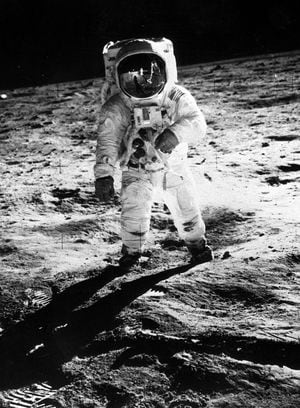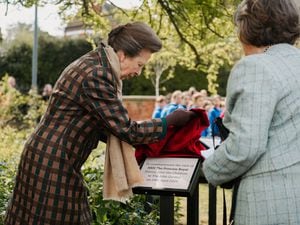The epic mission which gripped the world
You had to live through it to understand the sense of wonder and excitement surrounding the Apollo 11 mission of 50 years ago.

It was a sensational, thrilling adventure, the stuff of sci-fi made real. These were days when young boys were brought up on a diet of Dan Dare and The Eagle.
Nor was it just the young who were mesmerised. Speaking at her Shrewsbury care home last year shortly before her death at the age of 100, Lady Joan Dunn said: “If anybody asked me the most amazing thing during the course of my life, I would say the Man on the Moon.”
It was also dangerous, an exploit involving brave men with nerves of steel operating at the frontiers of the possible, stretching to the limit the technology of the day.
If it all went wrong, they faced the most lonely and yet most public of deaths, marooned in space with no hope of rescue.
Even more dangerous, indeed, than many members of the public knew at the time. Some astronauts put the odds of a safe landing on the lunar surface at 50-50. That was just one part of the entire mission.
The 1960s was the decade of the space race. In vowing to send a man to the moon before the decade was out, President Jack Kennedy had made an important qualification. To send a man to the moon – and return them safely to Earth.
To the public it was an epic of exploration, but in the freeze of the Cold War, to America and the Soviet Union it was war by other means.
At the start of the race, the Soviets had been winning hands down. First into space, first woman into space, first space walk, first multiple crew...
American prestige had been restored to some extent when the US sent the first men to the moon with Apollo 8 and the Russian "threat" of sending the first men actually to walk on the moon faded.
For the US the Apollo mission was a beacon of optimism and hope as the nation was convulsed by the continuing Vietnam War. For Britain, there were our own troubles with a rising tide of violence in Northern Ireland.
It was also the decade in which the Shropshire Star was born, bringing something hitherto unheard of in the realms of a British daily newspaper – full colour. We followed the space race in all its twists and turns.
Bang on schedule, Apollo 11 blasted off from Cape Kennedy in Florida on Wednesday, July 16, 1969, covered live on Britain's three television channels – BBC1, BBC2, and ATV.
Shropshire was in the middle of a heatwave, with temperatures hitting 82F, a smidgeon down on the 83F recorded on the Tuesday. That had been the county's hottest day of the year so far.
Space was on everybody's minds. Shropshire had visions of a "space age" new town, called Telford.
Yet it was also an age of black and white televisions (colour sets were so expensive that few had them), on which millions watched the moonshot spellbound. Forget rocket fuel – Shropshire's only remaining colliery at Granville had notched up a record output of 9,678 tons of saleable coal.
As Apollo prepared for landing, cadets of Shrewsbury's 1119 Squadron of the Air Training Corps kept a non-stop 24-hour vigil at their headquarters at Coleham, listening in on transmissions with their high powered receivers.
The lunar module "Eagle" landed on the moon at 21.17 BST on Sunday, July 20. At 3.56am British time on Monday, July 21, Armstrong became the first man ever to step on the moon. Children were woken from their beds so they could witness history in the making.
Incidentally the moonwalk date is given by NASA as July 20. The reason is simple – America is behind British time and a new day had not yet begun there.
People were simply awestruck.
Joan Young, a 22-year-old teacher from Wellington, when asked whether the space mission was money well spent, replied: “Yes, because of all the things they have discovered in research work as they have been going along.
“From photographs taken from space they have been able to tell when grain is going bad before it can be seen down here.
“And they can track fish under the sea. This means they could direct trawlers. I think in the long run it will be worth it.”
With the world gripped by space race fever, local businesses were getting in on the act.
Salop Caravan Centre in Meole Brace ran a front page advert in the Shropshire Star in which it pictured a Sprite touring caravan landing on the moon with the slogan "A Sprite on the moon is a thing of the future."
Schoolboy Julian Jones, 14, of Astley Abbotts, was a keen astronomer who had his own six-inch reflector telescope.
“I think it’s too incredible for words,” said the pupil at Bridgnorth Grammar School who had been following the mission on television for days and had had little sleep.
Twelve-year-old Norah Hughes, of Ryton, Dorrington, said: “If they did not do things like this, we would still be cavemen. I think it is a wonderful thing for everyone, and I would like to go there when they have a few houses.”
She thought though that Russia and America should join forces to save money.
"If they had done that they would probably be landing on Mars now."
Jasper Moon – and no prizes for guessing why he was asked for a quote – aged 89, of Penyfoel, Llanymynech, said: “America was quite right to go ahead with its lunar exploration whatever the cost. It shows a capitalist country can compete with a Communist country, and America has just done this.”
An American woman who was in Shrewsbury at the time, Mrs Virginia Case, of Connecticut, said: "It has shown us the courage, self-sacrifice and discipline of man which have been lost sight of in our time.
"We are so concerned in material achievement; but this particular achievement was possible only because a few men had great courage and were willing to discipline themselves.
"It will give us back a sense of heroism which we have, to a large extent, lost."
However, she said: "I feel it was a terrible mistake to plant the US flag without the flag of the United Nations."
Here's an extract from the Shropshire Star editorial of July 21: "All the superlatives have already been used to describe the moon landing achievement.
"Man has once again demonstrated his ingenuity, his need to explore, his desire to seek wider horizons.
"This urge to see, to explore, to experiment has kept man going, although collecting tragedies on the way.
"The biggest voyage of discovery has just been completed.
"We raise our hat to three brave men, Neil Armstrong, Edwin Aldrin, and Michael Collins, who must have watched his colleagues' descent to the moon's surface with anxiety."
At the time, nobody could be sure that the trio would return to Earth safely. They did. Mission accomplished.
Yet it was a one-off. There were further moonshots, but things were never the same again, and not in the way you might expect. Because the magic quickly faded and interest in space travel waned.
Generally humanity's gaze lowered from the moon and the stars and returned to Earth.
Today youngsters use powerful computers without thinking. They play games which take them into virtual reality worlds. Their heroes, if they have them, are celebrities, sports stars, musicians...
Neil Armstrong, the first person to walk on the moon, a man whose name became immortal in just a few hours 50 years ago, came to Shropshire in 2010 and had lunch at an Italian restaurant in Shrewsbury.
Hardly anybody recognised him.





